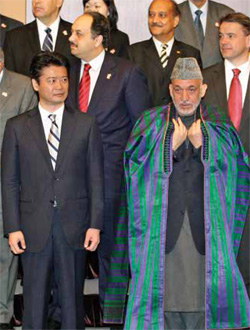Afghanistan’s Post-2014 Futures?

 The ‘great game’ is moot. Success (or failure) depends on Kabul and the Afghans
The ‘great game’ is moot. Success (or failure) depends on Kabul and the Afghans
Explaining the current situation in Afghanistan or assessing the country’s future trajectory has actually never been as challenging as for many other places in the world. For analysts, practitioners and Afghans themselves, there often is but one paradigm and one narrative – the ‘great game.’ Ask any average Afghan, and he or she will most likely say that all of the ills of the country over the centuries have been due to the ‘great game’ involving outside powers – big and small alike. Of course, the persistence of this analytical paradigm relieves Afghans – particularly Afghanistan’s leaders – of any deep sense of responsibility for the misfortunes and instability of their country.
As the US, the UK, Canada and their partners in the International Security Assistance Force (ISAF) begin to pull out their troops, the Afghan theatre is slowly but surely inching toward a messy and murky endgame. With the emergence – actual and anticipated – of multiple new strategic players to contest the post-2014 Afghan space, phrases like the ‘return’ or ‘re-enactment’ of the ‘great game’ have begun to dominate the analytical discourse. To be sure, the interests of a number of countries are and will continue to be at play in Afghanistan after 2014. Such countries or groups of countries fall under one of three categories: stakeholders, free-riders and spoilers. Still, it is far more likely that the post-ISAF Afghan ‘game’ will ultimately depend largely on the particular domestic political, social and economic conditions created by the Afghans themselves, rather than on factors rooted in brute geopolitical competition.
A transition to Afghan responsibility does not necessarily mean a complete abandonment of the country by the international community in general, and by the US and its ISAF allies in particular. At the July 2012 donors’ conference in Tokyo, more than 70 countries pledged their support to Afghanistan. In May 2012, the Chicago Summit Declaration on Afghanistan mandated a US $4.1 billion fund to sustain the Afghan security forces beyond 2014. At the same time, the May 2012 Enduring Strategic Partnership Agreement between Afghanistan and the US reflects the American commitment to assist Afghanistan in its social and economic development after the military disengagement. The US will have the right to use Afghan security facilities until 2014, after which its role will be to train the Afghan army and security forces.
In practice, therefore, American personnel and forces will remain in Afghanistan until at least 2024. Some of the other partners in ISAF, like the UK, Canada and Australia, will also remain engaged, albeit in non-military missions. Though India did not commit any troops, its contribution – especially in building much-needed infrastructure and providing training for good governance – will keep it engaged as a stakeholder in Afghanistan’s stability and growth.
A number of initiatives involving regional and international partners also hold significant prospects for Afghanistan. These include the new Silk Road to connect Afghanistan and neighbouring countries in order to boost cross-border trade; the CASA 1000 (Central Asia-South Asia Regional Electricity Market, or CASAREM), aimed at establishing electricity transmission and trading infrastructure between Central Asia and South Asia; the TAPI (Turkmenistan-Afghanistan-Pakistan-India) or Trans-Afghanistan Pipeline; and new rail and road networks for improved domestic and regional connectivity. Apart from the South Asian Association for Regional Cooperation (SAARC) and the Shanghai Cooperation Organization (SCO), through which regional countries have invested to ensure a stable and secure Afghanistan, initiatives like the Central Asia Regional Economic Cooperation (CAREC) Program, the Economic Cooperation Organization (ECO), Heart of Asia and, among others, the Regional Economic Cooperation Conference on Afghanistan (RECCA) have collectively contributed to the development of the country.
At the same time, Afghanistan’s new-found mineral and energy resources and its manifest regional connectivity for commerce and transit have drawn in free-riders interested in extracting economic rents without substantially committing to the country’s security and stability. China has, in this sense, made major investments in the country in mining, telephony and energy, reaping what some say are the benefits of a war fought and paid for by others. Beijing has refrained from any military involvement in Afghanistan, and has refused to contribute to the fund mandated to sustain the Afghan security forces beyond 2014. While China would like to have its investments protected, its biggest worry comes from the East Turkestan Islamic Movement (ETIM), which has been fighting for the separation of China’s Xinjiang province. Though the group is currently based in Pakistan, Beijing fears that, should the Taliban come to power, Afghanistan may once again become a safe-haven for the ETIM, which could use Afghan soil for training and attacks in China. Reports suggest that China could be negotiating with the Taliban – through Pakistan – in order to extract assurances that it will not give any sanctuary or support to the East Turkestan militants in the event that it springs a comeback.
Russia, too, is in the race to bolster its geopolitical position. It hopes to earn returns on its various investments in economic ventures in Afghanistan. Publicly, Moscow claims that its main concern is to counter the Afghan narcotics trail, and to sever militant links with its restive Chechen region. Having said this, it is little amused by the American-backed new Silk Road project, which competes with the Moscow-favoured CASA 1000. It is also uncomfortable with the growing bonhomie between the US and certain Commonwealth of Independent States (CIS) countries, and with the prospect of Washington retaining some forces in Afghanistan until at least 2024. Indeed, Moscow is capitalizing on the declining US-Pakistan relationship by strengthening its own ties with Islamabad, finding common interest with Pakistan and China in reducing Western influence in Afghanistan.
Pakistan is looking to resume its pre-9/11 strategic role – that is, to once again be a decisive force in the security and governance of Afghanistan. It should be seen principally as a spoiler, given Islamabad’s tensions with Washington and the support of the Pakistani military and intelligence establishment for the Taliban and other groups hostile to Afghanistan’s interests. It is Pakistan’s support – via the provision of sanctuary and resources – that has kept the Taliban going, despite the blows dealt by ISAF operations and American drone strikes. Though Pakistan is not likely to directly endorse and support the Taliban in an outright bid to retake Kabul by force, its covert sponsorship will likely allow the Taliban to significantly undermine the peace, security and development of Afghanistan through indiscriminate violence, including suicide attacks and the targeted killings of high-profile figures and political leaders.
There are a number of reasons for which the post-2014 Afghan ‘game’ will be different from the past. Afghanistan is today in a significantly better position than it was at the end of the Soviet occupation in 1989. It is promised massive aid, which will underwrite its security and development projects. It has tremendous potential for foreign investment – particularly in its mining and energy sectors, as well as in infrastructure. It can also presumably hope – if not expect – that key stakeholder countries will keep the divisive forces at bay. Pure or raw geopolitical rivalries in-theatre should therefore be less influential in Afghanistan’s future.
Much, therefore, depends on Kabul’s own performance after the ISAF troop withdrawal. The Karzai government, already overwhelmed by legitimacy and trust deficits, does not at present appear to be up to the task of stabilizing or even holding the country together. When US President Obama first announced the troop pullout, there was widespread scepticism – even within the US – about the timing, size and pace of the drawdown. Some saw the troop withdrawals as aggressive, and as potentially jeopardizing hard-won gains. Others deemed them appropriate precisely because they would create a sense of urgency for the Afghanistan government to get its act together. Still, many serious analysts consider the so-called ‘transition to Afghan responsibility’ to be irresponsible – especially when the country is still, for all practical intents and purposes, in a wholesale mess in terms of security and governance.
Even though President Karzai continues to urge the international community to trust Afghanistan’s forces to secure the country’s future, the key question remains whether the country is itself ready to bear the burdens of transition. If the Afghan government manages to strengthen and professionalize its security forces, and purge them of militant infiltrations, then it may ultimately be able to fend off the Taliban and retain control of some important parts of the country.
Still, despite the billions that it has received in aid, Kabul’s capacity to deliver competent administration and credible development in far-flung areas remains weak. Inefficient and corrupt governing structures – including the judicial system – have enabled the Taliban to emerge as an alternative power structure in parts of the country. In the near-term, of course, it would be difficult for the Taliban to take and hold Kabul, given the combined strength and firepower of the Afghan security forces, bolstered by the Americans. But Kabul must ensure that it holds these forces together, particularly in view of the concern that they could splinter along ethnic lines, which would increase the risk of the country reverting to past patterns of warlordism – possibly leading to civil war.
The pledge of US $16 billion to Afghanistan at Tokyo was very specific in stating that the “International Community’s ability to sustain support for Afghanistan depends upon the Afghan Government delivering on its commitments […].” These commitments include, among others, a pluralistic political system, a stable democracy based on the rule of law, an effective and independent judiciary, and, more generally, transparency and accountability in governance, and the rooting out of corruption. On its current record, the capacity of the Afghan government to meet these conditions should rightly be questioned. And medium-term failure by Kabul to deliver good government – a twist on what John Lewis Gaddis once famously called the “tyranny of the weak” – would most certainly test the patience of its multiple outside backers.
Arabinda Acharya is Research Fellow and Head of Strategic Projects at the International Centre for Political Violence and Terrorism Research at the S. Rajaratnam School of International Studies, Nanyang Technological University, Singapore.
Antara Desai is a student of Geopolitics and International Relations at Manipal University, India.









